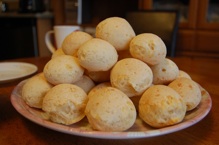Pão de Queijo Recipe
Published on Aug 26, 2020 by Marcus Santos.
Preamble - the origins of Pão de Queijo

In Brazilian-portuguese, Pão de Queijo literally means Bread of Cheese.
The origins of Pão de Queijo can be traced back to the 1600’s. At that time, slaves in Minas Gerais state worked in the manual production of Manioc Flour for the rich farmland owners. They harvested manioc (yucca root), peeled and finely grated it, soaked the mush in water in a big wood bowl (called gamela), washed and drained this grated manioc, then spread it on tiled floor outdoors to dry.
In search for something to eat, slaves would scrape the white manioc starch (called polvilho) that remained at the bottom of the gamelas, make small balls and bake them. These balls had neither cheese nor milk, just plain polvilho. Two hundred years later, cattle farms became widespread in Brazil, and slaves (who were being freed by that time) gained access to better foods such as milk and cheese. They therefore began to add milk and ultimately cheese when preparing those balls. Voilà, pão de queijo was created. Later this “recipe” spread among the rest of the population, and Pão de Queijo became popular in Minas Gerais and other Brazilian states.
Nowadays, it is part of the tradition in Minas Gerais to serve fresh brewed coffee and Pão de Queijo to a visitor.
Recipe
(thanks go to Dora Alice Corwin for her suggestions on how to improve the presentation of this recipe).
This recipe makes roughly 2 dozen appetizer-sized balls.
- Preheat oven to 380F.
- Boil the following until white foam appears:
- 1/3 cup of vegetable oil
- 1/2 cup of water
- 1/2 cup of milk
- 1 tsp salt (it really depends on the type of cheese you are using. E.g., not needed if using parmesan as it is very salty already)
- Add this hot mixture to 2 cups of tapioca starch (See note 1 below). Mix well with a wooden spoon and let rest until it cools down.
- Add 2 eggs and about 6 ounces of grated hard cheese to the mix (See note 2 below). Then knead it until you get a gooey, sticky mass (See note 2 below).
- To form balls, lightly cover hands with grease, use a teaspoon and quickly roll into ball shape as best you can (they will smooth out during baking). Each ball should be about 1- 1/2 inch in diameter. Bake on a lightly greased sheet or on parchment paper.
- Bake for 25 minutes, depending on size, until tops begin to brown.
Notes:
- Tapioca (mandioca in Brazilian-portuguese) is also called manioc, yucca, or cassava. The Canadian chain Bulk Barn carries, to my surprise, manioc starch (which looks like a clear white thin powder).
- Since cheese is rather expensive here in Canada, I have tried the cheapest cheddar cheese (old or mild) I could possibly find, and even hard mozzarela. It works great! But if money is not your problem, you may try parmesan instead. May I also add that if you have an issue with your cholesterol, try some light cheddar.
- The kneading of the dough is the most important step in the process of making pão de queijo. You should only stop kneading when the dough becomes sort of elastic and smooth. And this requires some effort, believe me.